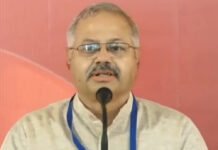INVC NEWS
Aligarh – : The esteemed Peethadhishwar Pandit Dhirendra Mohan Shastri of Bageshwar Dham government has made a fervent appeal to change the name of Aligarh district in Uttar Pradesh to Harigarh. This passionate plea was directed towards the Chief Minister of Uttar Pradesh, Yogi Adityanath.
The statement made by Pandit Dhirendra Shastri has generated considerable enthusiasm among the youth of the district, who have been supporting his demand for quite some time. Notably, the renowned storyteller Dhirendra Shastri has also extended his support to this cause.
The demand for renaming Aligarh as Harigarh gained traction during the organization of the grand 108 Kundiya Mahayagya and Bhagwat Katha in Hardaspur, a prominent locality within the metropolis of Aligarh. Pandit Dhirendra Mohan Shastri, being unable to attend physically, joined the event through video conferencing and made a significant statement regarding the name change. He emphasized that if Aligarh is renamed as Harigarh, he will personally visit the city. This statement has sparked a range of discussions and debates among the people of Aligarh.
On the one hand, some of the younger population assert that Aligarh was not the original name of the city. They argue that some leaders changed its name to Aligarh during their tenure. Activists associated with the Bharatiya Janata Party (BJP) have voiced their opinion, urging Chief Minister Yogi Adityanath to take note of Pandit Dhirendra Mohan Shastri’s statement and officially rename Aligarh as Harigarh. Their contention is that the name change would resonate positively with the city’s identity, as the inclusion of “Hari” in Harigarh would symbolize a connection to the divine.
However, it is crucial to note that not everyone is in agreement with this proposition. Mufti Jahad Ali Khan, a respected religious leader in Aligarh, vehemently criticized Pandit Dhirendra Shastri’s statement, cautioning that such demands could lead the country towards destruction. He emphasized that the nation belongs to all its citizens, including Muslims, who have played a significant role in its history and will continue to do so. Mufti Jahad Ali Khan stressed the importance of a united partnership that ensures the well-being of all communities, rather than erasing any specific group’s name.
It is essential to approach this issue with sensitivity and inclusivity, considering the diverse cultural and historical aspects of Aligarh. The significance of a name change goes beyond mere semantics, as it has the power to shape identity, perceptions, and the overall narrative associated with a city. Therefore, any decision related to altering the name of a place should be carefully evaluated, taking into account the sentiments of all sections of society.
Renaming cities or districts is not an uncommon occurrence in the history of India. It has often been done to honor eminent personalities, commemorate historical events, or revive indigenous heritage. Such changes can have far-reaching consequences and influence how a place is perceived locally, nationally, and even internationally. Therefore, any potential name change should undergo a rigorous process of research, consultations, and consensus-building among various stakeholders.
As citizens, we should strive for unity, respect, and harmony while engaging in discussions about renaming places. It is essential to embrace diversity and ensure that all voices are heard. Rather than fostering division, our focus should be on initiatives that promote progress, inclusivity, and a sense of shared heritage.
















